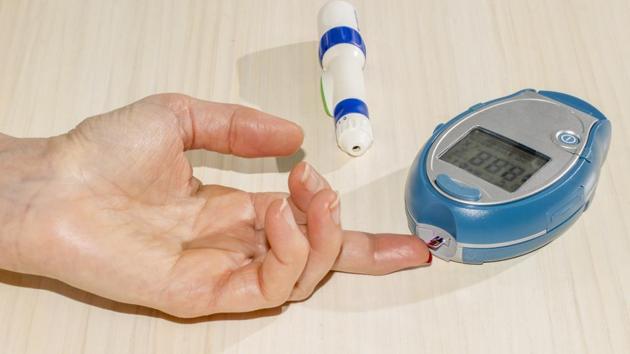December 8, 2024 02:30 PM (IST)
Diabetes and Reproductive Health: Blood sugar levels can affect fertility and the ability to conceive in both men and women. Here's how to avoid risks for a healthy journey
Diabetes is a chronic disease that affects many aspects of health, including reproductive health. Diabetes affects fertility in both men and women through various mechanisms.
Dr. Monica Kumbhat of Neuberg Diagnostics said in an interview with HT Lifestyle, “For women, diabetes, especially 2 Diabetes can cause hormonal imbalances, affecting ovulation and menstrual regularity, and making pregnancy more difficult. The insulin resistance associated with diabetes increases androgen levels and disrupts reproductive hormones. In men, diabetes can lower testosterone, cause erectile dysfunction, reduce sperm quality, and affect the chances of a successful pregnancy.
Diabetes and female fertility
- Hormone imbalance and menstrual irregularities: Diabetes, especially type 1 and type 2 diabetes, can disrupt hormonal balance, resulting in irregular menstrual cycles or even no periods at all. These abnormalities result from the interaction of insulin and sex hormones and can affect ovulation.
- High risk for polycystic ovary syndrome (PCOS): Women with type 2 diabetes are at increased risk of developing PCOS, a condition characterized by irregular ovulation, high androgen levels, and insulin resistance. PCOS is one of the leading causes of infertility, and since insulin resistance is involved in both diabetes and PCOS, these symptoms often overlap.
- Increased risk of miscarriage and complications: Women with poorly controlled diabetes are at increased risk of miscarriage, premature birth, and birth complications. Elevated blood sugar levels during early pregnancy can increase the risk of birth defects in the fetus.
Diabetes and male fertility
- Decreased testosterone and erectile dysfunction: Diabetes is associated with decreased testosterone levels in men, which can lead to erectile dysfunction (ED). Not only does ED affect your sexual health, it also impairs your ability to conceive naturally. High blood sugar can damage blood vessels and nerves and interfere with normal erectile function.
- Sperm quality issues: High blood sugar levels cause oxidative stress, which can damage sperm DNA. This can affect the chances of successful fertilization and increase the risk of genetic abnormalities in the offspring.
- Retrograde ejaculation: Neuropathy, or nerve damage caused by high blood sugar, can cause retrograde ejaculation, where semen enters the bladder instead of exiting through the urethra. This condition can make it difficult to conceive naturally. Although this is irreversible, assisted reproductive technologies such as intrauterine insemination (IUI) and in vitro fertilization (IVF) can provide an alternative for men with this condition.

Managing diabetes during pregnancy
- Pre-pregnancy planning and blood sugar control: Women with diabetes should aim for optimal blood sugar levels before pregnancy to reduce the risk of complications. The target HbA1c level should generally be less than 6.5%, but this goal varies depending on the individual's health status.
- Monitor blood sugar levels and adjust treatment: During pregnancy, insulin requirements often change, so blood sugar levels must be carefully monitored. Gestational diabetes, which is temporary diabetes during pregnancy, can also affect women who don't have diabetes. Monitoring and adjusting insulin and medications as needed can minimize risks to both mother and baby.
- Specialized care for gestational diabetes: Gestational diabetes generally develops during the second trimester of pregnancy and often resolves after delivery. However, women with gestational diabetes are at increased risk of developing type 2 diabetes later in life.
- Additional screenings, tests, or supplements specifically recommended for people with diabetes to maximize the chances of a healthy pregnancy with IVF: In addition to standard prenatal vitamins, people with diabetes may benefit from supplements such as folic acid, omega-3 fatty acids, and antioxidants, which can support egg quality, fetal development, and overall metabolic health. there is. Regular HbA1c tests, kidney and liver function tests, and, if necessary, echocardiography can help ensure stable health during pregnancy. Effective blood sugar control, a balanced diet, and regular physical activity during pregnancy can reduce the chance of complications such as high birth weight, which may require a caesarean section.
Disclaimer: This article is for informational purposes only and is not a substitute for professional medical advice. Always seek the advice of your doctor with any questions you may have regarding a medical condition.
Catch all the big hits and…
See more
Check out Hindustan Times website and app for all the latest lifestyle news on fashion, Taylor Swift, health, festivals, travel, relationships, recipes and more every day.
